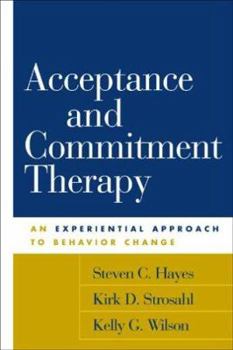Acceptance and Commitment Therapy: An Experiential Approach to Behavior Change
Select Format
Select Condition 
Book Overview
Since the original publication of this seminal work, acceptance and commitment therapy (ACT) has come into its own as a widely practiced approach to helping people change. This book provides the... This description may be from another edition of this product.
Format:Paperback
Language:English
ISBN:1572309555
ISBN13:9781572309555
Release Date:July 2003
Publisher:Guilford Publications
Length:304 Pages
Weight:0.98 lbs.
Dimensions:0.9" x 6.0" x 9.0"
Related Subjects
Behavioral Sciences Clinical Clinical Psychology Compulsive Behavior Education & Reference Health, Fitness & Dieting Health, Fitness & Dieting Internal Medicine Medical Medical Books Medicine Mental Health Politics & Social Sciences Psychiatry Psychology Psychology & Counseling Psychopathology Psychotherapy Psychotherapy, TA & NLP Science & Math Social Science Social Sciences Social WorkCustomer Reviews
4 ratings
Challenging but Worthwhile
Published by Thriftbooks.com User , 15 years ago
This was a challenging read for a layperson like me because the book is written for practitioners. There is a lot of jargon and technical terminology that is not easy to absorb. Most of this is concentrated in the section on the philosophical foundation of Acceptance and Commitment Therapy (ACT). Nevertheless, this is a critical chapter in understanding the basis for ACT, particularly the role that language plays in trapping individuals by fusing them with their thoughts (which are expressed verbally, even if internally). I will definitely need to re-read the book to get the full depth of meaning. The remaining chapters are more accessible and include valuable therapy sesssions transcripts . These transcripts enable the reader to see the ACT approach at work, particularly the use of metaphors and paradoxes to loosen the client from the grip of language. I have been applying the mental attitude suggested by ACT - detachment from language and thought, being a mindful observer - and it has been very helpful in reducing tension and self-criticism. I have also found myself questioning, at the most basic level, many of the "truisms" that I have come to accept without challenge. When you think about this, there are scores of these by which we judge ourselves, from simple sayings like "Cleanliness is next to godliness" to "Virtue is its own reward." These may or may not be true or accurate, but the point is that we accept them blindly, and judge ourselves in some way by doing so. I recently reviewed The Happiness Trap: How to Stop Struggling and Start Living, which could be called an "ACT for Dummies" book. The material there is more accessible, but I think that the work by Hayes and his co-authors is a critical "pre-quel" to the Happiness Trap. If you read Acceptance and Commitment Therapy patiently, it will pay great dividends as a companion work to the Happiness Trap.
Still the core ACT book
Published by Thriftbooks.com User , 16 years ago
In my opinion, this is still the core ACT book to read. This book is just packed with a wealth of information, insights, and novel approaches to clinical problems. There is no other ACT book written to date that matches this one in its scope, overview, and coherence in terms of explaining the ACT model and linking it to the basic behavioral principles with underlie the approach. Even though I've had this book for almost a decade, I still refer to it's dogeared and underlined pages almost every week. If you are a therapist interested in ACT, this book should be in your hands.
Acceptance and Commitment Therapy:An Experiential Approach to Behaviour Change
Published by Thriftbooks.com User , 19 years ago
A really good overview and also in depth approach to a new therapy that could well be the next CBT - easy to read and with some very clear examples and analogies. I recommend it to anyone that has found that CBT has some gaps in regards to recurrance and behaviour change.
Challenging Current Thinking in Clinical Psychology
Published by Thriftbooks.com User , 24 years ago
Hayes and colleagues have made an excellent contribution with their book Acceptance and Commitment Therapy (ACT) by drawing together many years of theoretical work and practice into a very readable work. The first half of the book outlines the theoretical foundations of ACT. Many recent books in clinical psychology claim to offer a new psychotherapeutic technique or a new approach within a particular conceptual framework. In contrast, Hayes and colleagues present a new and comprehensive conceptual foundation for psychotherapy. They seek to challenge some of the cherished notions in mental health (e.g., that mental disorders always arise from abnormality) and critique some of the central ideas in many popular therapies (e.g., the idea in Cognitive Behaviour Therapy that mental health will be improved by changing the content of one's thoughts). Their argument identifies language and our use of it as both one of the key reasons for humanity's success and our inability to rid ourselves of many mental health issues. For a reflective practitioner or academic, the arguments presented will give the reader much food for thought.The second half of the book outlines the practice of ACT and as such illustrates the fist part. This sections is excellent in that even thought it uses language to describe ACT, it attempts to use the principles of ACT upon the reader and gives the reader examples to work though at the end of each chapter. Thus, the reader cannot emerge at the end of the book without having been changed by reading the book.The ability to critique current thinking in clinical psychology is not novel, but the ability to present an alternative is much more rare. Hayes and colleages have done so and have presented it in a way that will be accessible to practitioners and researchers from many different theoretical orientations. A challenging and thought-provoking book.





